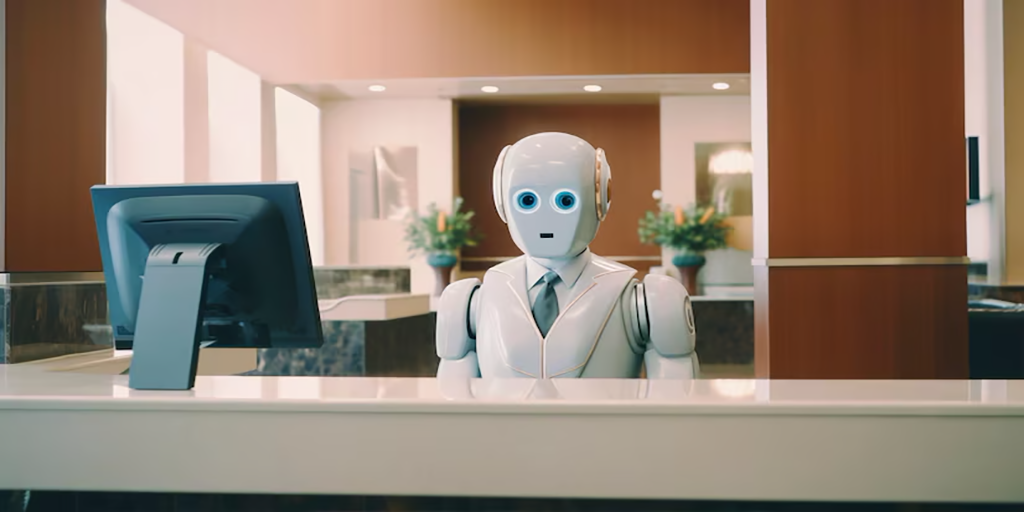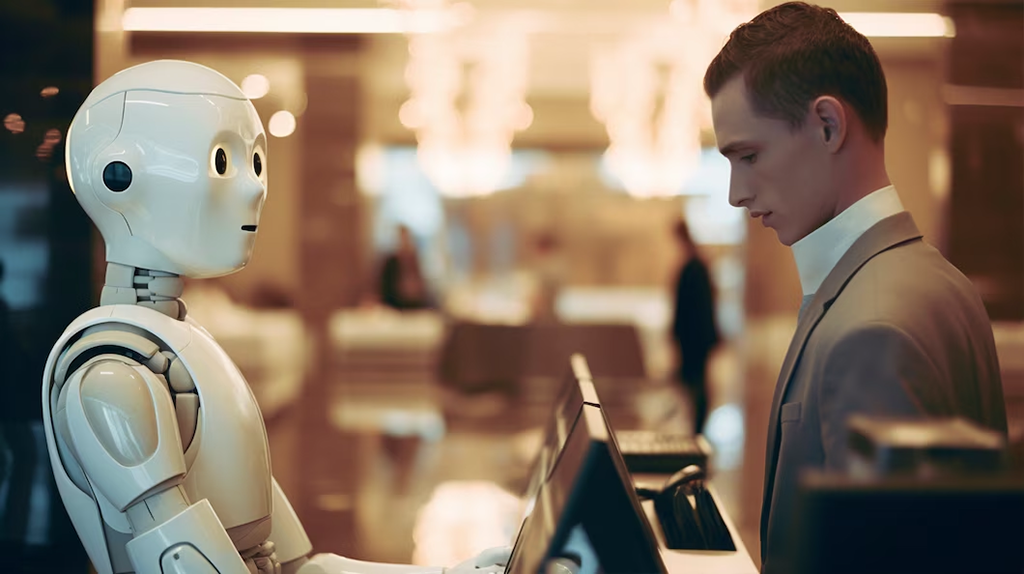How AI in the Hospitality Industry Is Changing the Game?

The hospitality industry, a beacon of personalized service and human touch, stands on the cusp of a transformative era with Artificial Intelligence (AI) integration. This technological leap is altering the landscape of guest experiences and reshaping hotel employment and training dynamics. In this article, we delve into the nuanced impact of AI on these facets, understanding that while AI brings efficiency and innovation, it also presents challenges and opportunities for the workforce.
What is Artificial Intelligence (AI)?
Artificial Intelligence (AI) is a field within computer science focused on enabling machines and computers to replicate human intelligence. In AI, machines are designed to emulate human thought processes and perform tasks traditionally requiring human intervention, utilizing human-like problem-solving and decision-making capabilities.
AI encompasses a diverse array of rapidly developing technologies, including deep learning, machine learning, and expert systems. For instance, AI-powered systems like self-driving cars and space exploration robots learn from their experiences. Current research is exploring the application of more advanced AI technologies, such as Generative Adversarial Networks (GANs) and Edge AI, across various sectors.
Different Forms of Artificial Intelligence
Robotics (Robotics):
- Applied to robots to perform autonomous or semi-autonomous tasks.
- Applications: manufacturing, healthcare.
Machine Learning (ML):
- Learns from data to make predictions or decisions.
- Applications: recommender systems, fraud detection.
Natural Language Processing (NLP):
- Understands and generates human language.
- Applications: chatbots, translation, sentiment analysis
Explanation of AI Technology Relevance in the Hospitality Industry
In the tourism industry, AI's influence has grown significantly, revolutionizing aspects from travel planning to enhancing customer experiences at destinations. By mimicking human intelligence, AI offers innovative solutions that boost operational efficiency and enrich travelers' experiences, underscoring the importance of embracing these technologies within the tourism sector
Artificial Intelligence (AI) is revolutionizing the hospitality industry, and the world, as we know it. In the United States alone, AI is expected to contribute to a 21% increase in GDP by 2030, highlighting the economic impacts of this new technology
There are always two sides to a coin

Artificial intelligence (AI) is transforming the hospitality industry, affecting various areas such as customer service, operational processes and data analytics. Below are the positives and negatives of using AI in hospitality.
Positive Impacts of AI in Hospitality
- Improved Customer Service:
- Chatbots: Provide instant 24/7 service, handling inquiries and bookings efficiently.
- Personalized Experiences: AI analyzes customer preferences to offer tailored recommendations and services.
- Process Automation:
- Faster Check-In/Out: Digital keys and automated systems speed up these processes.
- Facility Management: Predictive maintenance using IoT and AI reduces downtime.
- Increased Revenue:
- Revenue Management: AI optimizes room pricing by analyzing market data.
Cross-Selling and Promotions: Custom suggestions boost additional service sales.
Negative Impacts of AI in Hospitality
- Loss of Human Touch:
- Over-automation can reduce personal interactions, affecting the hospitality feel.
- Privacy Concerns:
- Data collection and analysis raise privacy and data security issues.
- Costs and Investments:
- Implementing advanced AI systems requires significant investments in technology and staff training.
- Technology Dependence:
- Over-reliance on technology can lead to issues when systems face technical problems.
Importance of Addressing these Changes for Both Workers and Management
Adapting to AI means embracing continuous learning and skill development for the workforce. For management, it’s about balancing leveraging AI for operational efficiency and nurturing a workforce skilled enough to complement this technology. Addressing these changes is crucial for maintaining a harmonious work environment and ensuring that the human essence of hospitality remains intact in an AI-driven future.
Smart Marketing and Revenue Management
AI can play a vital role in optimizing marketing efforts and revenue management within the hospitality industry. AI algorithms can analyze large volumes of customer data, market trends and competitor insights to develop targeted marketing campaigns and pricing strategies.
By leveraging AI in hotels, hospitality industry professionals can personalize marketing messages, identify profitable market segments and optimize pricing strategies in real time. Students interested in hospitality can gain insights into AI-driven marketing techniques and revenue management strategies to drive business growth and maximize profitability.
Technology Trends in Hotels
The hospitality industry is rapidly evolving with technological advancements transforming how hotels operate and interact with guests. Here are some key technology trends currently shaping the hotel industry:
- Contactless Technology:
- Mobile Check-In/Out: Guests can use their smartphones to check in and out, reducing the need for physical interaction at the front desk.
- Digital Room Keys: Smartphones serve as room keys, enhancing security and convenience.
- Contactless Payments: Payment transactions are made seamless and secure through digital wallets and contactless cards.
- Artificial Intelligence (AI) and Machine Learning:
- Chatbots and Virtual Assistants: AI-powered chatbots handle guest inquiries, bookings, and provide information 24/7, improving guest satisfaction.
- Personalized Guest Experiences: AI analyzes guest data to offer personalized recommendations and services, such as room preferences and activity suggestions.
- Internet of Things (IoT):
- Smart Rooms: IoT devices control lighting, temperature, and entertainment systems, allowing guests to customize their room environment via mobile apps or voice commands.
- Predictive Maintenance: IoT sensors monitor equipment performance, predicting maintenance needs to prevent breakdowns and reduce operational costs.
- Enhanced Connectivity:
- High-Speed Wi-Fi: Providing reliable and fast internet access is crucial for business travelers and digital nomads.
- 5G Technology: The rollout of 5G will further enhance connectivity, enabling better service for guests and supporting advanced tech implementations like AR/VR.
- Augmented Reality (AR) and Virtual Reality (VR):
- Virtual Tours: Potential guests can explore hotel facilities and rooms through VR before booking.
- AR-Enhanced Experiences: Guests can use AR apps to get information about hotel amenities, local attractions, and events.
- Robotics and Automation:
- Service Robots: Robots assist with luggage handling, room service delivery, and housekeeping tasks, improving efficiency and guest experience.
- Automated Processes: Backend operations, such as inventory management and billing, are streamlined through automation.
- Sustainability and Green Technology:
- Energy Management Systems: Smart systems optimize energy use for heating, cooling, and lighting, reducing the hotel’s carbon footprint.
- Water Conservation Technologies: Advanced systems monitor and reduce water usage, promoting sustainable practices.
- Big Data and Analytics:
- Revenue Management: Data analytics tools help hotels set optimal pricing strategies based on demand forecasts and market trends.
- Guest Insights: Analyzing guest data helps hotels understand preferences and behavior, leading to better marketing strategies and service enhancements.
- Blockchain Technology:
- Secure Transactions: Blockchain ensures secure and transparent transactions, enhancing trust in payment processes.
- Loyalty Programs: Blockchain-based loyalty programs offer secure and easily redeemable rewards for guests.
- Enhanced Cybersecurity:
- Data Protection: With increasing cyber threats, robust cybersecurity measures protect guest information and hotel operations.
- Compliance: Hotels implement technologies to comply with data protection regulations like GDPR.
Embracing these technology trends is essential for hotels to stay competitive and meet the evolving expectations of guests. By leveraging advancements in AI, IoT, connectivity, and sustainability, hotels can enhance operational efficiency, personalize guest experiences, and promote environmental responsibility. Staying ahead of technological developments will help hotels attract and retain guests, ultimately driving business success in the digital age.
Conclusion
The hospitality industry, renowned for its personalized service, is undergoing a transformative change with the integration of Artificial Intelligence (AI). AI enhances customer service through chatbots and personalized experiences, automates processes like check-ins, and optimizes revenue management. However, it also brings challenges such as the potential loss of human touch, privacy concerns, and high implementation costs. For both workers and management, adapting to AI requires continuous learning and skill development to maintain the human essence of hospitality while leveraging technological advancements for efficiency and growth.
AI is a game-changer in hospitality, offering numerous benefits while posing challenges. Embracing AI involves balancing technological advancements with human elements to ensure the industry's growth and sustainability.
Source: https://www.phocuswright.com







